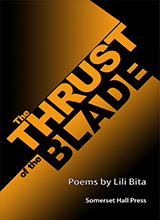Lili Bita – The Thrust of the Blade. Reviewed by Rochelle Holt
(Chiron Review, Summer 2011.)
If it’s possible to surpass the diversely brilliant poetry and fiction volumes (including the author’s compelling memoirs, Sister of Darkness), Lili Bita, also a renowned actress, has outdone herself. The Thrust of the Blade is both erotic (if lust that imposes will on flesh) and political with allusions to Lili Bita’s Greek heritage in poems that also reference and lyrically translate film, painting and relationships with the past that haunt any human being’s present.
“My Name is Caryatid” refers to a column designed as a draped female form. However, in this case, the statue is personified and metamorphosed into woman removed from company of her sisters whose longing to feel desire is ultimately betrayed.
En route in a coffin (probably a museum), the manmade statue is cognizant.
A drunken soldier groped for my sex
and left his stain on me while his fellows
laughed. Here I stand. The young men
no longer pay me the tribute of their desire.
My sisters no longer comfort me.
Night leaves me no star. Here I stand,
beyond pity or hope. My name is Caryatid.
Part II of the book opens with “The Ice Woman: A Story of Desire” where
The woman visits his guard house
every night;
She lies next to him.
He takes her shadow
and makes it flesh…
Neither friend nor foe
approaches him
to offer a cigarette
or the silent thrust
of a blade….
He doesn’t care about the cold,
he only holds her tight
until the spasms free his limbs,
and desire frees the world.
The war continues.
There is something both timeless and au courant in Lili’s Bita’s work, whether poetry or fiction. Here, she encapsulates emotions in narrative that consists of vibrant imagery, unique metaphor and perennial symbolism to unfold one of her piercing themes: women are seen as objects in myriad cultures, including our own.
“In Memoriam” (Asia Minor, 1922) depicts woman as:
the body spread-eagled
as in Da Vinci’s drawing….
Look at her puberty,
the black camellia
plucked from the roots
of its innocence….
In the poem (written as a short play) “The Reaping of the Bud,” another child, only eleven, is “washed by her mother with mud” as part of the coming-of-age ritual.
….The elder will prepare me
for a man….
Before she covers my eyes
I see the rusty knife
coming down on me….
Such barbaric and invasive rituals exist still as traditions in Africa and elsewhere.
“A Piece of Meat” identifies another abusive and still little-known practice in the name of religion:
Day begins
in the little Tibetan town….
It’s peaceful here,
ten thousand feet up….
The cart climbs the hill
with a woman’s body
naked under a white
shroud….
Four men sharpen
their knives
on a stone…
(Monks continue to chant while)
The guide tells us,
“Death takes our spirit.
What’s left is just
a piece of meat.”….
(One wonders if men are included in this experiment to prove that humans are nothing but bone turns to ash.)
Poignantly but not blatantly philosophical, these poems (beneath the lyrical substance) force readers to ponder the pain in life’s bizarre rituals and ceremonies that yield pleasure mainly for the perpetrators.
In “Deceit,” the poet refers to Greece as symbol of any pertinent, historical place that is deceptively beseeching while possibly unaware of or oblivious to the exploitation of deceit. Ultimately, in the end,
The city’s lights
mislead us,
the razzle-dazzle of our make-believe.
The island yields our journey’s secret.
The dead crowd its fields.
The wind sings its dirge.
The graves stand open,
waiting for us.
Lili Bita and her translator Robert Zaller are both well-travelled to many countries and the islands of Greece. Their experience enriches both the former’s poems and the latter’s most superior translation.
The Thrust of the Blade is a double entendre that refers to the nature of warriors who impart permanent wounds on their victims who may not be totally blameless because of their longing for Eros (including its brutal desire for dominance and domination). This recent volume should be incorporated into all courses in high school or at the higher education level: historical, literary, sociological or otherwise. Phenomenal enlightenment through absolutely sinuous poetry!

